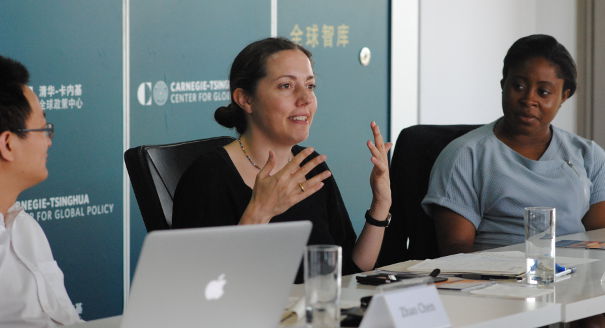Registration
You will receive an email confirming your registration.
Chinese President Xi Jinping’s recent tour of Europe underscored the strengthening of China-EU economic ties over the last few years. However, changes in the EU’s internal political sphere may affect the current state of China-EU relations. Most notably, extreme right-wing parties in Denmark, Austria, the United Kingdom, and France have made significant gains in the EU Parliament elections.
Carnegie–Tsinghua’s Shi Zhiqin hosted a roundtable discussion between Chinese scholars and EU and UK embassy representatives to discuss the impact of the latest election on the future of China-EU relations.
Discussion Highlights
- Increased Cooperation: As the EU recovers from its sovereign debt crisis, China has become an increasingly important trade partner, discussants said. However, Chinese participants expressed concern that the European public still has a negative view of China in spite of these growing connections. European participants disagreed, asserting that the European public has a positive image of China, as Chinese investment has already created jobs and infrastructure in Europe.
- Promotion of International Trade: EU has an annual GDP that exceeds 12 trillion dollars, but participants noted that the EU still needs to raise its level of international trade. The European Commission has been working since October to negotiate an investment agreement with China.
- Rise of the Far Right? Participants agreed that far-right political parties in Europe are currently gaining ground because of dissatisfaction with the current political and economic situation throughout the EU. The dissatisfaction is focused particularly on the austerity program and high unemployment rate. However, one European participant pointed out that in the EU Parliamentary elections, 58 percent of French voters abstained and only 34.9 percent of the population voted in the United Kingdom. She concluded that support for and election of anti-establishment parties is a way for a small part of European citizens to express frustrations. Participants noted that most EU citizens see the European Parliament as something far away that does not have much effect on them.
- Impact on EU-China Relations: Extreme right parties are anti-globalization. But one participant stated that in order to solve problems with unemployment, EU governments must partner with investor countries such as China. This leaves anti-establishment leaders in a difficult position. Participants noted that there is a risk of a more protectionist and inward-looking EU as the far right gains power, but most members in the EU Parliament are open to promoting free trade.
- Far Right Still Powerless: Participants noted that at many stages in EU parliamentary procedures, members need an absolute majority to pass legislation, which the far right does not have. Mainstream parties such as the European People’s Party have already agreed to work with other mainstream parties in order to block legislation from anti-establishment parties. Participants agreed that far-right parties are also generally fragmented, lack coherence, and focus on publicity rather than legislative action.
Discussants include: Doyin Adele-Shiyanbola, Kathrin Greve, Li Weiwei, Sophie Maysonnave, Zhao Chen, Zhang Lei
